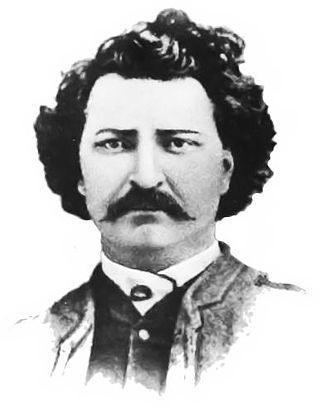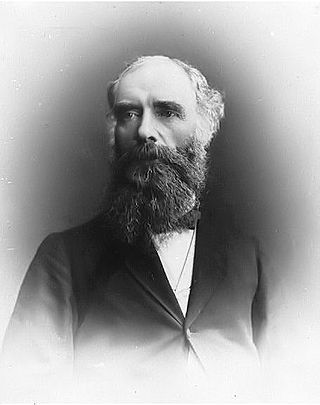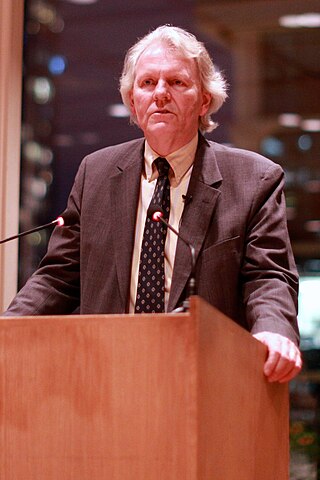
Louis Riel was a Canadian politician, a founder of the province of Manitoba, and a political leader of the Métis people. He led two resistance movements against the Government of Canada and its first prime minister John A. Macdonald. Riel sought to defend Métis rights and identity as the Northwest Territories came progressively under the Canadian sphere of influence.

Joseph Marie, comte de Maistre was a Savoyard philosopher, writer, lawyer, diplomat, and magistrate. One of the forefathers of conservatism, Maistre advocated social hierarchy and monarchy in the period immediately following the French Revolution. Despite his close personal and intellectual ties with France, Maistre was throughout his life a subject of the Kingdom of Sardinia, which he served as a member of the Savoy Senate (1787–1792), ambassador to Russia (1803–1817), and minister of state to the court in Turin (1817–1821).

Calixa Lavallée was a Canadian musician and Union Army band musician during the American Civil War. He was born in the Province of Canada. He is best known for composing the music for "O Canada", which officially became the national anthem of Canada in 1980, after a vote in the Senate and the House of Commons. The same 1980 Act of Parliament also changed some of the English lyrics. A further alteration to the English lyrics was made again in 2018. The original French lyrics and the music, however, have remained unchanged since 1880.

Sir William Edmond Logan, FRSE FRS FGS, was a Canadian-born geologist and the founder and first director of the Geological Survey of Canada.

Alexander Morris was a Canadian politician. He served in the cabinet of Prime Minister John A. Macdonald (1869–1872), and was the second Lieutenant Governor of Manitoba (1872–1877). He also served as the founder and first Lieutenant Governor of the District of Keewatin.

Donald Alexander Smith, 1st Baron Strathcona and Mount Royal,, known as Sir Donald A. Smith between May 1886 and August 1897, was a Scottish-born Canadian businessman who became one of the British Empire's foremost builders and philanthropists. He became commissioner, governor and principal shareholder of the Hudson's Bay Company. He was president of the Bank of Montreal and with his first cousin, George Stephen, co-founded the Canadian Pacific Railway. He was elected to the Legislative Assembly of Manitoba and afterwards represented Montreal in the House of Commons of Canada. He was Canadian High Commissioner to the United Kingdom from 1896 to 1914. He was chairman of Burmah Oil and the Anglo-Persian Oil Company. He was chancellor of McGill University (1889–1914) and the University of Aberdeen.
Alexander Brott,, born Joël Brod, was a Canadian conductor, composer, violinist and music teacher.

Thomas Eugene Flanagan is an American-born Canadian author, conservative political activist, and former political science professor at the University of Calgary. He also served as an advisor to Canadian prime minister Stephen Harper until 2004.
Donald Harman Akenson is an American historian and author. He is a fellow of both the Royal Society of Canada and the Royal Historical Society (UK). He is a Molson Prize Laureate, awarded for a lifetime contribution to Canadian culture. He was awarded a Guggenheim Fellowship in 1984, and in 1992 he won the Grawemeyer Award. Akenson received his B.A. from Yale University and his doctorate from Harvard University. He is Distinguished University Professor and Douglas Professor of History at Queen's University in Kingston, Ontario, Canada, and was simultaneously Beamish Research Professor at the Institute of Irish Studies, University of Liverpool (2006–10), and senior editor of the McGill-Queen's University Press (1982-2012).
The McGill–Queen's University Press (MQUP) is a Canadian university press formed as a joint venture between McGill University in Montreal, Quebec and Queen's University at Kingston in Kingston, Ontario.

Robert Tait McKenzie was a Canadian physician, educator, sculptor, athlete, soldier and Scouter. Born in Ramsay Township, Lanark County, Ontario, Canada, he attended McGill University in Montreal as an undergraduate and medical student, and was an instructor in its medical school beginning in 1894. In 1904, he moved to the United States to teach at the University of Pennsylvania in Philadelphia, Pennsylvania. In the 1930s, he returned to the county of his birth, retiring to the Mill of Kintail in Almonte.
Traditionalist conservatism, often known as classical conservatism, is a political and social philosophy that emphasizes the importance of transcendent moral principles, manifested through certain posited natural laws to which it is claimed society should adhere. It is one of many different forms of conservatism. Traditionalist conservatism, as known today, is rooted in Edmund Burke's political philosophy, which represented a combination of Whiggism and Jacobitism, as well as the similar views of Joseph de Maistre, who attributed the rationalist rejection of Christianity during previous decades of being directly responsible for the Reign of Terror which followed the French Revolution. Traditionalists value social ties and the preservation of ancestral institutions above what they perceive as excessive rationalism and individualism. One of the first uses of the phrase "conservatism" began around 1818 with a monarchist newspaper named "Le Conservateur", written by Francois Rene de Chateaubriand with the help of Louis de Bonald.
The study and teaching of philosophy in Canada date from the time of New France. Generally, Canadian philosophers have not developed unique forms of philosophical thought; rather, Canadian philosophers have reflected particular views of established European and later American schools of philosophical thought, be it Thomism, Objective Idealism, or Scottish Common Sense Realism. Since the mid-twentieth century the depth and scope of philosophical activity in Canada has increased dramatically. This article focuses on the evolution of epistemology, logic, the philosophy of mind, metaphysics, ethics and metaethics, and continental philosophy in Canada.
Canadian idealism is a Canadian philosophical tradition that stemmed from British idealism.

Mary Riter Hamilton was a Canadian painter, etcher, drawing artist, textile artist, and ceramics artist who spent much of her career painting abroad in countries including Belgium, France, Germany, Holland, Italy, Spain, and the United States.

Donald Joseph Savoie is a Canadian public administration and regional economic development scholar. He serves as a professor at l'Université de Moncton. In 2015, he was awarded the Killam Prize for his contribution to the field of social sciences.

Michael J. Prince is a Canadian political scientist and public policy and administration scholar. Prince is the Lansdowne Professor of Social Policy at the University of Victoria in Canada.
Andrée Lévesque is a historian specialising in the 20th century history of Québec, the history of the political Left, and women's history. After studies in geography at the University of Montreal and the Université Laval, she gained her Masters and PhD at Duke University.
An Examination of the Philosophy of Bacon is a posthumous work by Savoyard philosopher Joseph de Maistre, analyzing and criticizing the philosophy of Francis Bacon. It was published in 1836 and translated into English by Richard Lebrun in 1998.

Joseph de Maistre's Life, Thought, and Influence: Selected Studies is an anthology about the Savoyard diplomat and philosopher Joseph de Maistre. It was edited by Richard Lebrun for McGill–Queen's University Press, which published it in 2001. It includes chapters about Maistre's life, career, theories on religion, politics and language, relation to contemporaries and international legacy.











